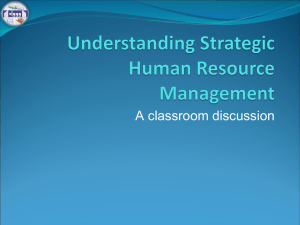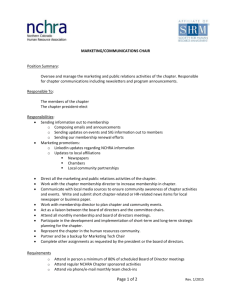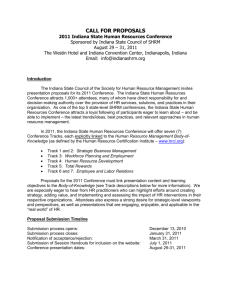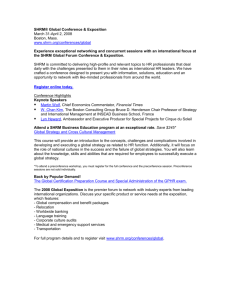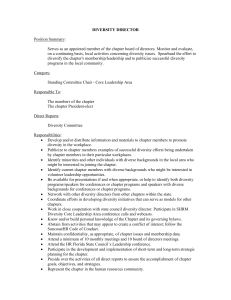Example of Call For Presenters - #1
advertisement
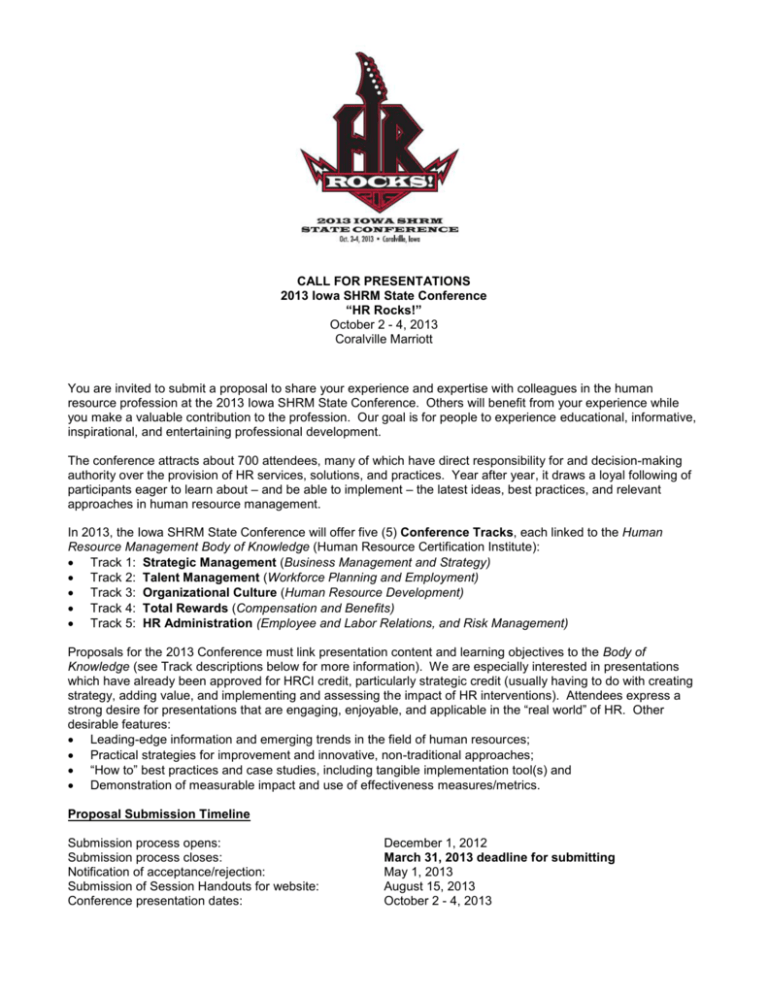
CALL FOR PRESENTATIONS 2013 Iowa SHRM State Conference “HR Rocks!” October 2 - 4, 2013 Coralville Marriott You are invited to submit a proposal to share your experience and expertise with colleagues in the human resource profession at the 2013 Iowa SHRM State Conference. Others will benefit from your experience while you make a valuable contribution to the profession. Our goal is for people to experience educational, informative, inspirational, and entertaining professional development. The conference attracts about 700 attendees, many of which have direct responsibility for and decision-making authority over the provision of HR services, solutions, and practices. Year after year, it draws a loyal following of participants eager to learn about – and be able to implement – the latest ideas, best practices, and relevant approaches in human resource management. In 2013, the Iowa SHRM State Conference will offer five (5) Conference Tracks, each linked to the Human Resource Management Body of Knowledge (Human Resource Certification Institute): Track 1: Strategic Management (Business Management and Strategy) Track 2: Talent Management (Workforce Planning and Employment) Track 3: Organizational Culture (Human Resource Development) Track 4: Total Rewards (Compensation and Benefits) Track 5: HR Administration (Employee and Labor Relations, and Risk Management) Proposals for the 2013 Conference must link presentation content and learning objectives to the Body of Knowledge (see Track descriptions below for more information). We are especially interested in presentations which have already been approved for HRCI credit, particularly strategic credit (usually having to do with creating strategy, adding value, and implementing and assessing the impact of HR interventions). Attendees express a strong desire for presentations that are engaging, enjoyable, and applicable in the “real world” of HR. Other desirable features: Leading-edge information and emerging trends in the field of human resources; Practical strategies for improvement and innovative, non-traditional approaches; “How to” best practices and case studies, including tangible implementation tool(s) and Demonstration of measurable impact and use of effectiveness measures/metrics. Proposal Submission Timeline Submission process opens: Submission process closes: Notification of acceptance/rejection: Submission of Session Handouts for website: Conference presentation dates: December 1, 2012 March 31, 2013 deadline for submitting May 1, 2013 August 15, 2013 October 2 - 4, 2013 Benefits of Speaking The Iowa SHRM State Conference provides a powerful platform to network with 700+ HR professionals and to share knowledge, lessons learned, and best practices in the field of HR. As a not-for-profit entity, the Iowa SHRM State Conference does not provide speaking fees. Instead, we ask that presenters share their expertise in the spirit of furthering the professional development of their colleagues. In exchange, we offer presenters the following: Complementary conference registration including access to all events Reasonable reimbursement of expenses for meals associated with required travel and conference attendance (receipts required) Valuable experience presenting at one of the best SHRM state-level conferences; Networking opportunities with and visibility to 700+ HR professionals; Travel expenses including coach air fare (pre-approval required for reimbursement) and/or mileage for out-of-town presenters; Required lodging at the conference hotel for out-of-town presenters (should be pre-approved and will be arranged by program committee); Assistance in shaping the presentation to meet attendee needs and presenter goals Logistics Each session will last 75 minutes, and we encourage you to leave time at the end for questions. The Conference always sells out! Because of space constraints, all sessions are in rooms set theater style (chairs only; no tables) for maximum occupancy as deemed by the facility and in accordance with local fire safety codes. Presenters should anticipate an audience size of approximately 30 to 120 people per session (more in some cases), and should design their presentation approaches with the facility logistics in mind. Please note that we are unable to modify or alter seating arrangements/setups for individual sessions. Rooms are equipped with standardized audio-visual: projection unit/screen and a microphone; any other A/V needs are arranged for by the presenter. Description of Conference Tracks for the 2013 Iowa SHRM State Conference Track 1: Business Management and Strategy Definition: Developing, contributing to, and supporting the organization’s mission, vision, values, strategic goals, and objectives; formulating policies; guiding and leading the change process; and evaluating organizational effectiveness as an organizational leader. Proposals in this track will highlight emerging trends/ideas, best practices, and relevant approaches to Business Management and Strategy and will permit attendees to explicitly acquire or enhance knowledge of one or more of the following: The organization’s mission, vision, values, business goals, objectives, plans, and processes; Strategic planning process and implementation; Management functions, including planning, organizing, directing, and controlling; Techniques to promote creativity and innovation; and Transition techniques for corporate culture, restructuring, M&A, offshoring, etc. Sample topics include: strategic HR management, strategic alignment, business management, business acumen, business partnering, culture change, ethics/integrity/corporate social responsibility, financial literacy, HR competencies, innovation, measurement/metrics/analytics, strategic HR technology, strategic thinking/planning, transformational change, trends and implications. Track 2: Talent Management (Workforce Planning and Employment) Definition: Developing, implementing, and evaluating sourcing, recruitment, hiring, orientation, succession planning, retention, and organizational exit programs necessary to ensure the workforce’s ability to achieve the organization’s goals and objectives. Proposals in this track will highlight emerging trends/ideas, best practices, and relevant approaches to Workforce Planning and Employment and will permit attendees to explicitly acquire or enhance knowledge of one or more of the following: Planning techniques (e.g., succession planning, forecasting); Staffing alternatives (e.g., temporary / contract, outsourcing, job sharing, part-time); Quantitative analyses required to assess past and future staffing effectiveness (e.g., cost-benefit analysis, costs per hire, selection ratios, adverse impact); Recruitment strategies and sources (e.g., Internet, agencies, employee referral) for targeting passive, semi-active and active candidates; Interviewing techniques (e.g., behavioral, situational, panel); Use and interpretation of selection tests (e.g., psychological/personality, cognitive, motor/physical, assessment center); reliability and validity of selection tests/tools/methods; International HR / implications of global workforce for workforce planning and employment; Voluntary and involuntary terminations, downsizing, restructuring, and outplacement; Internal workforce assessment techniques (e.g., skills inventory, workforce demographic analysis); Employment policies, practices, and procedures (e.g., orientation and retention); and Employer marketing and branding techniques. Sample topics include: brand, communication, contingent staffing, diversity, downsizing, employment, engagement, generations, interviewing, mergers and acquisitions, mobile/virtual workforce, motivation, outplacement, recruitment, redeployment, reference/background checking, relocation, retention, selection, social media, sourcing, succession planning, talent review, testing, workforce planning. Track 3: Organizational Culture (Human Resource Development) Definition: Developing, implementing, and evaluating activities and programs that address employee training and development, performance appraisal, talent and performance management, and the unique needs of employees, to ensure that the knowledge, skills, abilities, and performance of the workforce meet current and future organizational and individual needs. Proposals in this track will highlight emerging trends/ideas, best practices, and relevant approaches to Human Resource Development and will permit attendees to explicitly acquire or enhance knowledge of one or more of the following: Career development and leadership development theories and applications; OD theories and applications; Training program development techniques to create general and specialized training programs; Training methods, facilitation techniques, instructional methods, and program delivery mechanisms; Performance appraisal methods (e.g., instruments, ranking and rating scales); Performance management methods (e.g., goal setting, job rotations, promotions); Applicable global issues (e.g., international law, culture, local management approaches/practices); Techniques to assess training program effectiveness, including use of applicable metrics (e.g., participant surveys, pre- and post-testing); and Mentoring and executive coaching. Sample topics include: assessment, career development, change, coaching, conflict management, development, e-learning, employee training, facilitation/presentation skills, goal setting, leadership development, mentoring, organization development, performance consulting/improvement, performance appraisal/management, team development, workforce learning and performance. Track 4: Total Rewards (Compensation and Benefits) Definition: Developing/selecting, implementing/administering, and evaluating compensation and benefits programs for all employee groups that support the organization’s strategic goals and values. Proposals in this track will highlight emerging trends/ideas, best practices, and relevant approaches to Total Rewards and will permit attendees to explicitly acquire or enhance knowledge of: Total rewards strategies (e.g., compensation, benefits, wellness, rewards, recognition, EAP); Budgeting and accounting practices related to compensation and benefits; Job evaluation methods; job pricing and pay structures; External labor markets and/or economic factors; Pay programs (e.g., incentive, variable, merit); Executive compensation methods; Non-cash compensation methods (e.g., stock options, ESOPs); Benefits programs (e.g., health and welfare, retirement, wellness, EAP, time-off); International compensation laws and practices (e.g., expatriate compensation, entitlements); and Fiduciary responsibility related to total rewards management. Track 5: HR Administration (Employee and Labor Relations, Risk Management) Definition: Analyzing, developing, implementing/administering, and evaluating: the employer/employee relationship; maintaining relationships and working conditions that balance employer and employee needs and rights in support of the organization’s objectives; and/or programs, plans, and policies that provide a safe/secure working environment and to protect the organization from potential liability. Proposals in this track will highlight emerging trends/ideas, best practices, and relevant approaches to Worker’s Compensation, FMLA, ADAAA, Employee and Labor Relations and/or Risk Management, and will permit attendees to explicitly acquire or enhance knowledge of one or more of the following: Applicable federal, state and local laws affecting employment in union and nonunion environments, such as antidiscrimination laws, sexual harassment, labor relations, and privacy (e.g., WARN Act, Title VII, NLRA, OSHA, ADA, HIPAA, Sarbanes/Oxley); Techniques for facilitating positive employee relations (e.g., employee surveys, focus groups, dispute resolution, labor/management cooperative strategies and programs); Employee involvement strategies (e.g., employee-mgt committees, self-directed work teams); Individual employment rights issues and practices (e.g., employment at will, negligent hiring, defamation, employees’ rights to bargain collectively); Workplace behavior issues/practices (e.g., absenteeism and performance improvement); Unfair labor practices (e.g., employee communication strategies and management training); The collective bargaining process, strategies, and concepts (e.g., contract negotiation and administration); Occupational injury and illness compensation and/or prevention programs; Investigation, monitoring, and surveillance procedures; incident and/or response plans; Workplace safety and/or security risks, including potential workplace violence conditions; General health and safety practices (e.g., evacuation, hazard communication); Data integrity, technology applications; and Financial Management practices and Fiduciary policies. Speaker(s) / Presentation(s) Proposal First name: Last name: Name of your primary contact if other than you: Telephone: - - ext. - ext. Email: Your (Presenter’s) Title: Organization: Telephone: - Email address: Mailing address: City, state and zip: , - Speaker / Organization web site address: Brief biographical sketch (100 words or less): If you’ve presented at an Iowa SHRM State Conference before, please indicate when: SHRM member? Certified? Available to present on the following date(s): Preference for: Morning Afternoon PHR SPHR Thursday, Oct 3 Any constraints: GPHR Friday, Oct 4 (am only) Title of the presentation as you suggest it be published (10 words or less): Brief summary/description of presentation (100 words or less): Web address/ link to sample of presentation List the top three to five (3-5) learning objectives of your presentation (using action verbs and explicitly linked to HR body of knowledge): 1. 2. 3. If this presentation has been approved for HR Certification Institute recertification credit in the past, please list the ORG PROGRAM number: Type of Credit: General International Strategic International and Strategic Please indicate which track your presentation is best suited for: If applicable, title of the second presentation as you suggest it be published (10 words or less): Brief summary/description of presentation (100 words or less): Web address/ link to sample of presentation List the top three to five (3-5) learning objectives of your presentation (using action verbs and explicitly linked to HR body of knowledge): 1. 2. 3. If this presentation has been approved for HR Certification Institute recertification credit in the past, please list the ORG PROGRAM number: Type of Credit: General International Strategic International and Strategic Please indicate which track your presentation is best suited for: Please list other SHRM, SHRM – affiliated, or other organization events where you have presented and/or are scheduled to present, including the title(s): Please provide the name, organization and phone number of two references who can attest to the quality of your previous presentations: Name: Organization: Telephone: - - ext. Name: Organization: Telephone: - - ext. Referred to the Iowa SHRM State Conference by (if applicable): Please provide the names of other speakers you’d recommend for our conference: Please indicate if your organization is interested in being an exhibitor or sponsor: Yes No In submitting this proposal, I certify that I am available for the date(s) designated above. I understand that I will not receive a speaking fee for the presentation(s). If selected, I agree to abide by the deadlines and other conditions of presenting. I understand that my conference presentation is not a showcase for promoting my business, practice or product, and I will not sell my products or services from the speaker platform. I understand I will provide summary updates or blog material prior to the conference for marketing materials. I have read and understand the statement above. Please save this form and attach it to an email to programs@iashrm.org. Please also attach a photograph of at least 300 dpi in jpg or tif format to be used for marketing purposes if selected. Upon evaluation by our Program Committee, we will contact you as a follow-up. If you are selected as a speaker, we will communicate with you further regarding specific arrangements. Thank you very much for your interest in being a part of a great conference experience!

